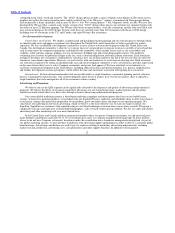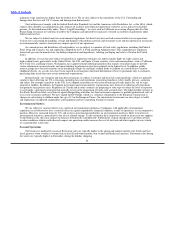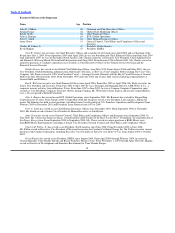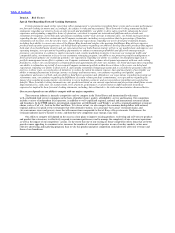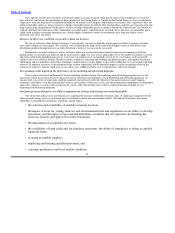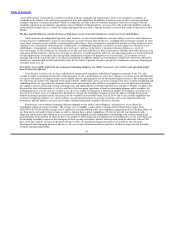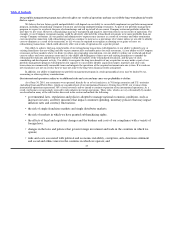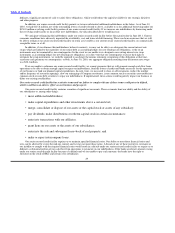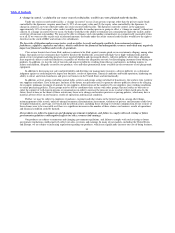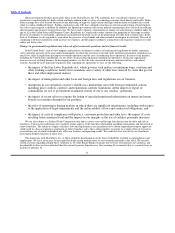Burger King 2010 Annual Report Download - page 23
Download and view the complete annual report
Please find page 23 of the 2010 Burger King annual report below. You can navigate through the pages in the report by either clicking on the pages listed below, or by using the keyword search tool below to find specific information within the annual report.
Table of Contents
Our geographic concentration increases vulnerability to general adverse economic and industry conditions and may have a
disproportionate effect on our overall results of operations as compared to some of our competitors that may have less restaurant
concentration.
Over the past 18 months, we have experienced, and may continue to experience, declining sales and operating losses in Germany,
primarily due to weak consumer confidence, lower discretionary spending and competitive factors. Germany is our second largest
market, and this restaurant concentration has negatively impacted our operating results. If we are unable to strengthen the operating
performance of the German restaurants, we could incur a decrease in our revenues and earnings which could negatively impact our
financial condition and our future revenue growth.
Our business is subject to fluctuations in foreign currency exchange and interest rates.
Our international operations are impacted by fluctuations in currency exchange rates and changes in currency regulations. In
countries outside of the United States where we operate Company restaurants, we generally generate revenues and incur operating
expenses and selling, general and administrative expenses denominated in local currencies. These revenues and expenses are translated
using the average rates during the period in which they are recognized and are impacted by changes in currency exchange rates. Further,
in some of our international markets, such as Canada, Mexico and the U.K., our suppliers purchase goods in currencies other than the
local currency in which they operate and pass all or a portion of the currency exchange impact on to us. In many countries where we do
not have Company restaurants, our franchisees pay royalties to us in currencies other than the local currency in which they operate.
However, as the royalties are calculated based on local currency sales, our revenues are still impacted by fluctuations in currency
exchange rates. In fiscal 2010, income from operations would have decreased or increased $12.5 million if all foreign currencies
uniformly weakened or strengthened by 10% relative to the U.S. dollar. However, different regions experience varied currency
fluctuations. As a result, if a region in which we have a high concentration of restaurants experiences a weakening in its currency, it
could adversely affect our income from operations even if other foreign currencies did not weaken.
Fluctuations in interest rates may also affect our business. We attempt to minimize this risk and lower our overall borrowing costs
through the utilization of derivative financial instruments, primarily interest rate swaps. These swaps are entered into with financial
institutions and have reset dates and critical terms that match those of our forecasted interest payments. Accordingly, any change in
market value associated with interest rate swaps is offset by the opposite market impact on the related debt. We do not attempt to hedge
all of our debt and, as a result, may incur higher interest costs for portions of our debt which are not hedged. In addition, we enter into
forward contracts to reduce our exposure to volatility from foreign currency fluctuations associated with certain foreign
currency−denominated assets, and from time to time we also hedge forecasted cash flows denominated in Canadian and Australian
dollars. However, for a variety of reasons, we do not hedge our revenue exposure in other currencies. Therefore, we are exposed to
volatility in those other currencies, and this volatility may differ from period to period. As a result, the foreign currency impact on our
operating results for one period may not be indicative of future results.
As a result of entering into these hedging contracts with major financial institutions, we may be subject to counterparty
nonperformance risk. Should there be a counterparty default, we could be exposed to the net losses on the hedged arrangements or be
unable to recover anticipated net gains from the transactions.
Increases in food and supply costs could harm our profitability and operating results.
Our profitability depends in part on our ability to anticipate and react to changes in food and supply costs. Any increase in food
prices, especially those of beef or chicken, could adversely affect our operating results. The market for beef and chicken is particularly
volatile and is subject to significant price fluctuations due to seasonal shifts, climate conditions, demand for corn (a key ingredient of
cattle and chicken feed), industry demand, international commodity markets, food safety concerns, product recalls, government
regulation and other factors, all of which are beyond our control and, in many instances unpredictable. If the price of beef, chicken or
other products that we use in our restaurants increases in the future and we choose not to pass, or cannot pass, these increases on to our
guests, our operating margins would decrease.
21



